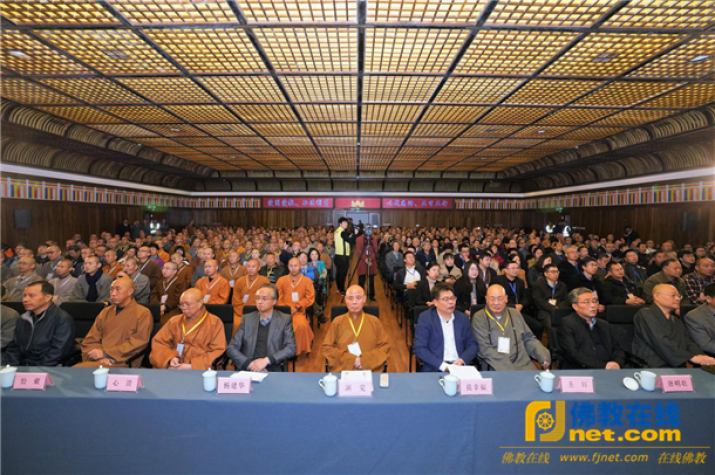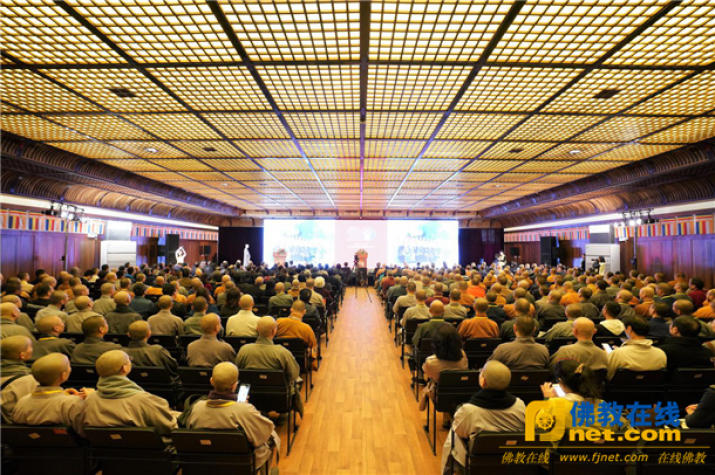NEWS
Hangzhou Buddhist Academy Celebrates 20th Anniversary
 Guests at Hangzhou Buddhist Academy. From fjnet.com
Guests at Hangzhou Buddhist Academy. From fjnet.comOn 14 November, the Hangzhou Buddhist Academy celebrated its 20th anniversary with over 600 people, including teachers, students, and alumni of various education institutes—including 22 universities and 25 Buddhist academies—present. Many of the guests were representatives of temples in Hangzhou and/or local government officials.
The celebration was attended by a plethora of associates and friends from the Buddhist Association of China (BAC), the Buddhist Association of Zhejiang, the Buddhist Association of Hangzhou, and the Hangzhou Buddhist Association. Staff from the religion department of Zhejiang University also made an appearance at the celebration. During the proceedings, Ven. Jueheng, vice-dean of the Hangzhou Buddhist Academy, read congratulatory messages from the leaders of the Buddhist Academy of Minnan in Xiamen, Hangzhou Dianzi University, the University of Arizona, and the Buddhist and Pali University of Sri Lanka.
Ven. Guangquan, dean of the Hangzhou Buddhist Academy, gave a speech describing the 20th anniversary as a new milestone that would invigorate the institute’s aim of creating a first-class, modern Buddhist institution, serving Chinese society with an eye to the needs of long-term development for both Buddhism and society, and maintaining social progress and harmony. “A first-class school must possess a first-class teaching team. It must offer a first-class methodology. It must have have first-class administration. And it must nurture first-class students.” (Fojiao zaixian)
 Attendees at the celebration of Hangzhou Buddhist Academy's 20th anniversary. From fjnet.com
Attendees at the celebration of Hangzhou Buddhist Academy's 20th anniversary. From fjnet.comMo Xingfu, deputy director of the Zhejiang Provincial Committee, gave a speech highlighting the achievements of the Hangzhou Buddhist Academy, as well as its calling to facilitate exchange with the rest of the world and advance Buddhist education. Invoking an idea that has been dominant in the intellectual circles of Chinese Buddhism since the late 19th century, Mo noted that the Buddhist academy (佛学院 foxue yuan) was at the foundation of any kind of Buddhist revival in the country.
“China is in the midst of a national rejuvenation,” said Mo, “and such a national rejuvenation requires a cultural equivalent. Buddhism is a major component of Chinese culture and is in its own period of rejuvenation. The renewal of Buddhism lies in the talents of its proponents, and the foundation of Buddhist talent is based in the Buddhist academy.” (Fojiao zaixian) He outlined three objectives that he hoped the academy would strive to realize: to adhere to the correct and accurate direction of school administration and maximize efforts and results; adhere to regulations and improve the school’s day-to-day running; and “adhere to orientation of culture and inherit excellent culture.” (Fojiao zaixian)
Prof. Xuan Fang of the Department of Philosophy at Renmin University said that Hangzhou Buddhist College had added a positive voice to contemporary Buddhist education, and that he hoped that the academy would further build on the ethos of Humanistic Buddhism (人间佛教 renjian fojiao) and train Buddhist talents (佛教人才 fojiao rencai) who possess a broad vision and perspectives. Ven. Jueheng affirmed that Hangzhou Buddhist Academy aims at becoming a future benchmark for other Buddhist academies and colleges by making further contributions to Chinese Buddhism and Buddhism on the world stage. Other local, regional, and Buddhist leaders echoed similar sentiments. (Fojiao zaixian)
The anniversary celebration concluded with a performance by singer, songwriter, and independent producer Dadawa, who is famed for her unique genre of world inspired music with distinct Chinese characteristics.
See more
Hangzhou University Holds 20th Anniversary Celebration (Chinese only) (Fojiao zaixian)
Related features from Buddhistdoor Global
“Many Have Gradually Realized that Buddhism is not a Superstition” – Dr. He Huanhuan Discusses Buddhist Studies in China
Monastic Seminaries and the Chinese Dream, Part One: Polity, Power, and Persuasion
Monastic Seminaries and the Chinese Dream, Part Two: United Fronts and Common Goals
Related news from Buddhistdoor Global
Chinese Cross-Strait Buddhists Hold Landmark Meetings with Japanese Buddhist Leaders
Buddhistdoor Global's Special Project: Buddhism in the People's Republic














